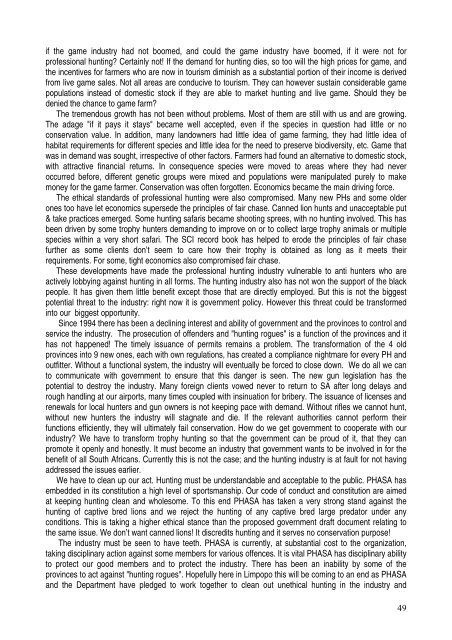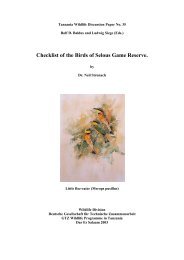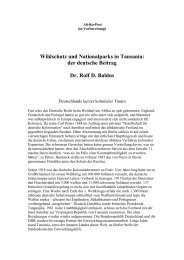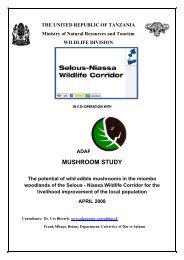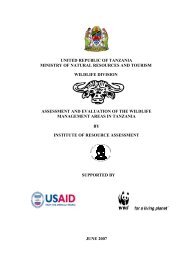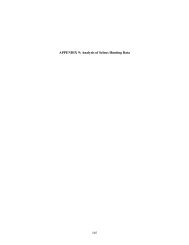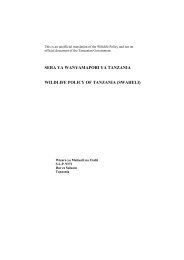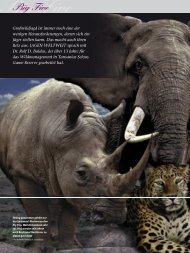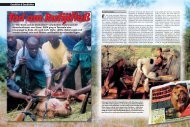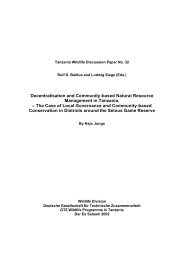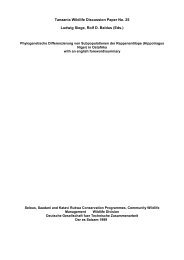African Indaba Articles - wildlife-baldus.com
African Indaba Articles - wildlife-baldus.com
African Indaba Articles - wildlife-baldus.com
Create successful ePaper yourself
Turn your PDF publications into a flip-book with our unique Google optimized e-Paper software.
if the game industry had not boomed, and could the game industry have boomed, if it were not forprofessional hunting? Certainly not! If the demand for hunting dies, so too will the high prices for game, andthe incentives for farmers who are now in tourism diminish as a substantial portion of their in<strong>com</strong>e is derivedfrom live game sales. Not all areas are conducive to tourism. They can however sustain considerable gamepopulations instead of domestic stock if they are able to market hunting and live game. Should they bedenied the chance to game farm?The tremendous growth has not been without problems. Most of them are still with us and are growing.The adage "if it pays it stays" became well accepted, even if the species in question had little or noconservation value. In addition, many landowners had little idea of game farming, they had little idea ofhabitat requirements for different species and little idea for the need to preserve biodiversity, etc. Game thatwas in demand was sought, irrespective of other factors. Farmers had found an alternative to domestic stock,with attractive financial returns. In consequence species were moved to areas where they had neveroccurred before, different genetic groups were mixed and populations were manipulated purely to makemoney for the game farmer. Conservation was often forgotten. Economics became the main driving force.The ethical standards of professional hunting were also <strong>com</strong>promised. Many new PHs and some olderones too have let economics supersede the principles of fair chase. Canned lion hunts and unacceptable put& take practices emerged. Some hunting safaris became shooting sprees, with no hunting involved. This hasbeen driven by some trophy hunters demanding to improve on or to collect large trophy animals or multiplespecies within a very short safari. The SCI record book has helped to erode the principles of fair chasefurther as some clients don’t seem to care how their trophy is obtained as long as it meets theirrequirements. For some, tight economics also <strong>com</strong>promised fair chase.These developments have made the professional hunting industry vulnerable to anti hunters who areactively lobbying against hunting in all forms. The hunting industry also has not won the support of the blackpeople. It has given them little benefit except those that are directly employed. But this is not the biggestpotential threat to the industry: right now it is government policy. However this threat could be transformedinto our biggest opportunity.Since 1994 there has been a declining interest and ability of government and the provinces to control andservice the industry. The prosecution of offenders and "hunting rogues" is a function of the provinces and ithas not happened! The timely issuance of permits remains a problem. The transformation of the 4 oldprovinces into 9 new ones, each with own regulations, has created a <strong>com</strong>pliance nightmare for every PH andoutfitter. Without a functional system, the industry will eventually be forced to close down. We do all we canto <strong>com</strong>municate with government to ensure that this danger is seen. The new gun legislation has thepotential to destroy the industry. Many foreign clients vowed never to return to SA after long delays andrough handling at our airports, many times coupled with insinuation for bribery. The issuance of licenses andrenewals for local hunters and gun owners is not keeping pace with demand. Without rifles we cannot hunt,without new hunters the industry will stagnate and die. If the relevant authorities cannot perform theirfunctions efficiently, they will ultimately fail conservation. How do we get government to cooperate with ourindustry? We have to transform trophy hunting so that the government can be proud of it, that they canpromote it openly and honestly. It must be<strong>com</strong>e an industry that government wants to be involved in for thebenefit of all South <strong>African</strong>s. Currently this is not the case; and the hunting industry is at fault for not havingaddressed the issues earlier.We have to clean up our act. Hunting must be understandable and acceptable to the public. PHASA hasembedded in its constitution a high level of sportsmanship. Our code of conduct and constitution are aimedat keeping hunting clean and wholesome. To this end PHASA has taken a very strong stand against thehunting of captive bred lions and we reject the hunting of any captive bred large predator under anyconditions. This is taking a higher ethical stance than the proposed government draft document relating tothe same issue. We don’t want canned lions! It discredits hunting and it serves no conservation purpose!The industry must be seen to have teeth. PHASA is currently, at substantial cost to the organization,taking disciplinary action against some members for various offences. It is vital PHASA has disciplinary abilityto protect our good members and to protect the industry. There has been an inability by some of theprovinces to act against "hunting rogues". Hopefully here in Limpopo this will be <strong>com</strong>ing to an end as PHASAand the Department have pledged to work together to clean out unethical hunting in the industry and49


